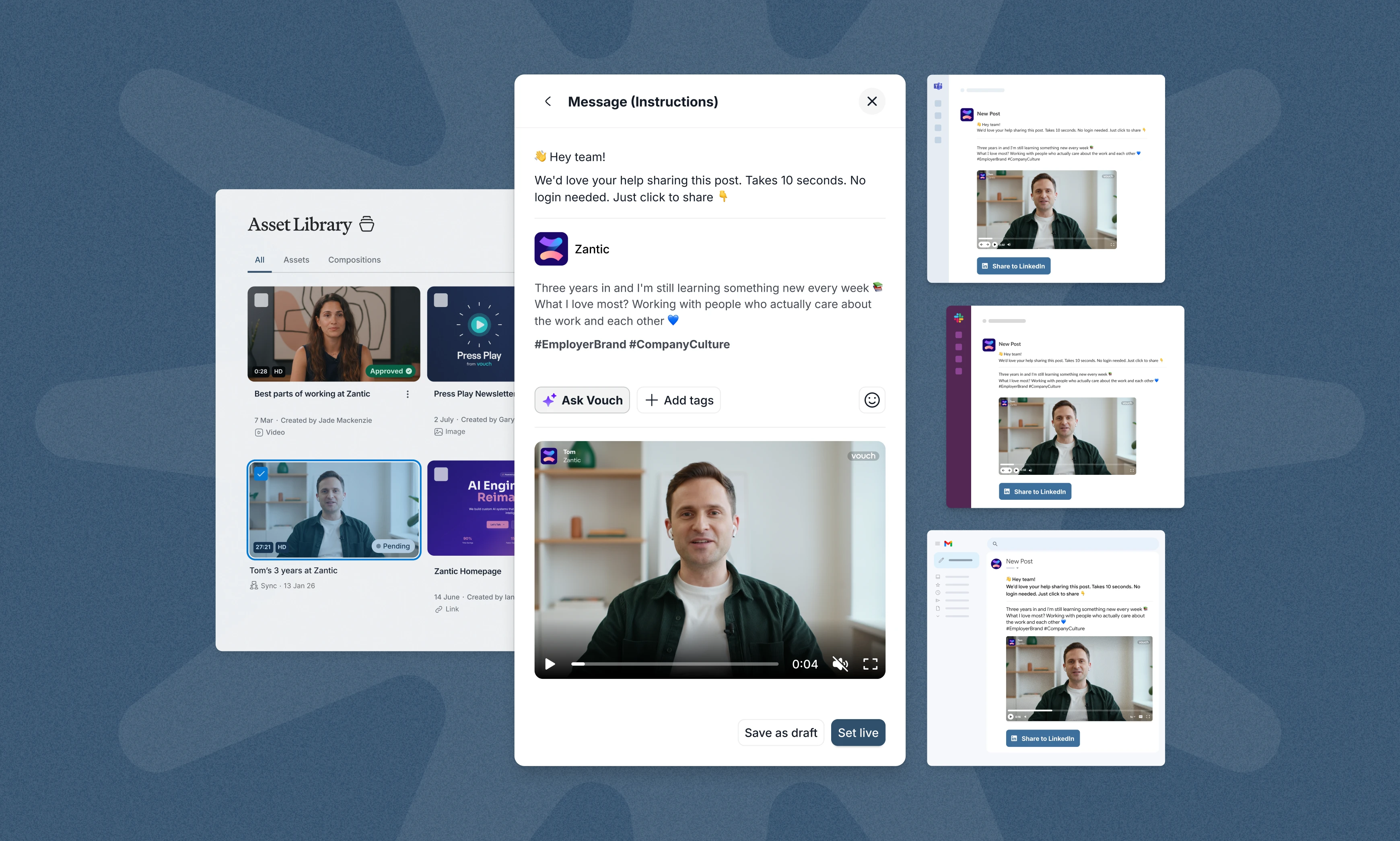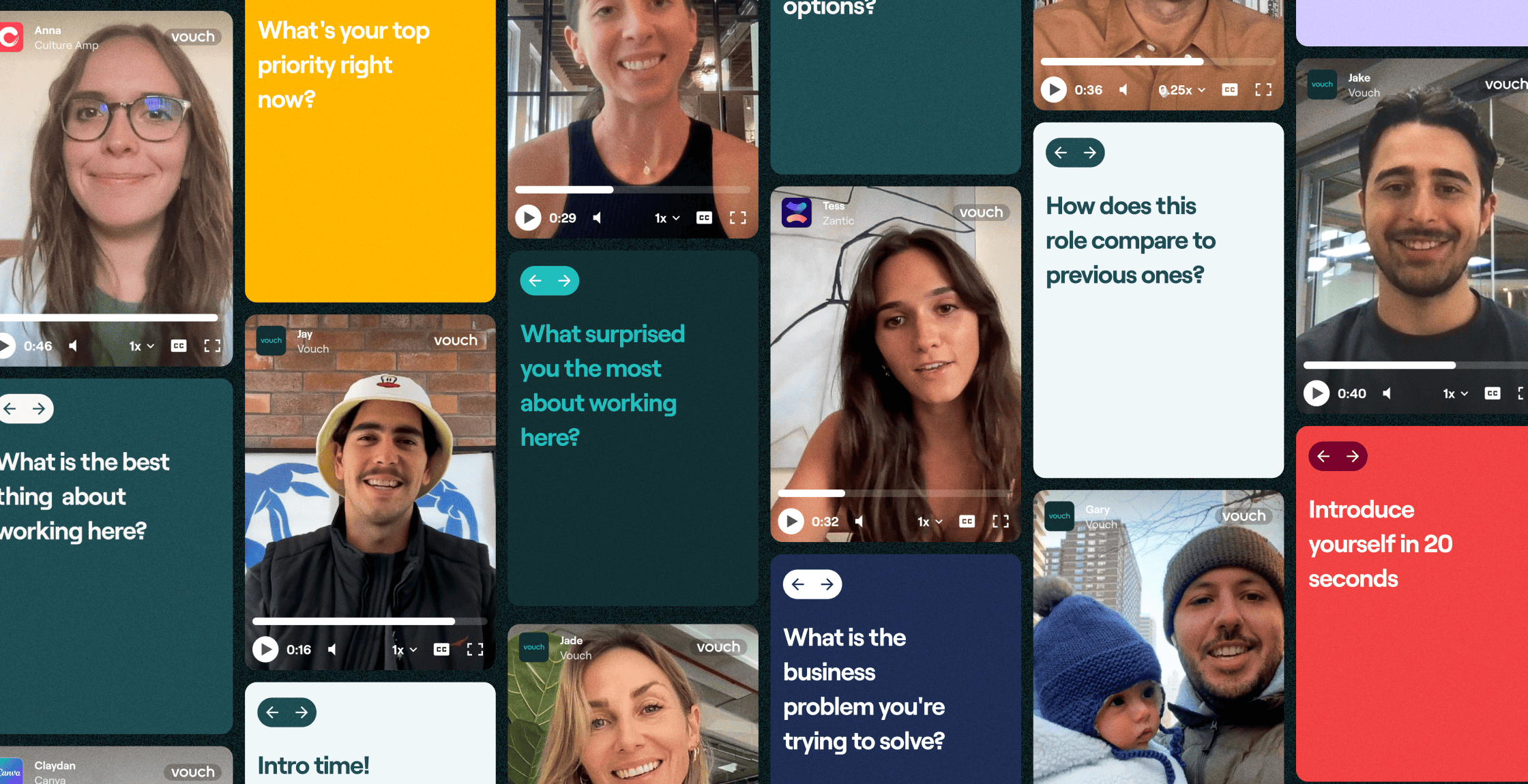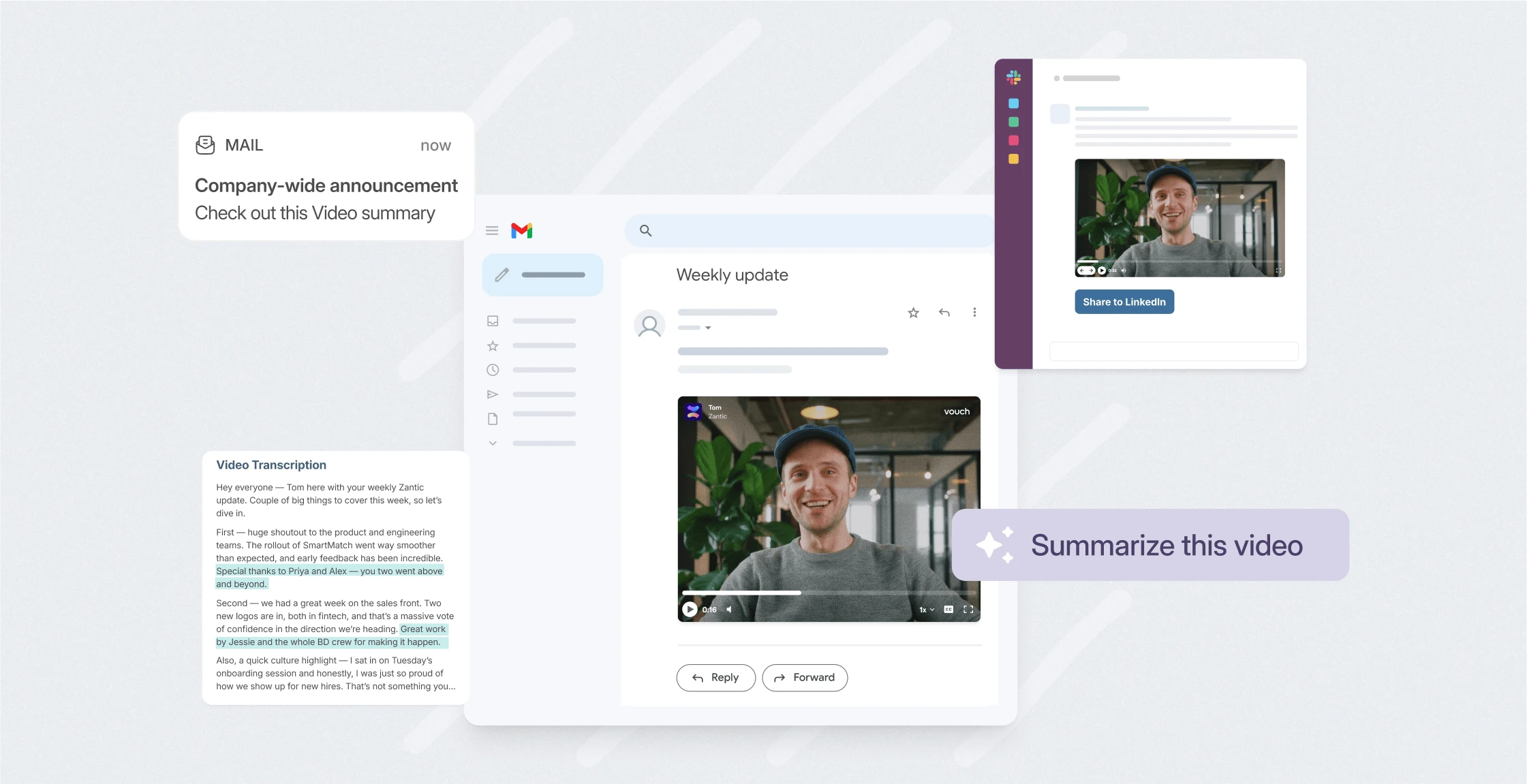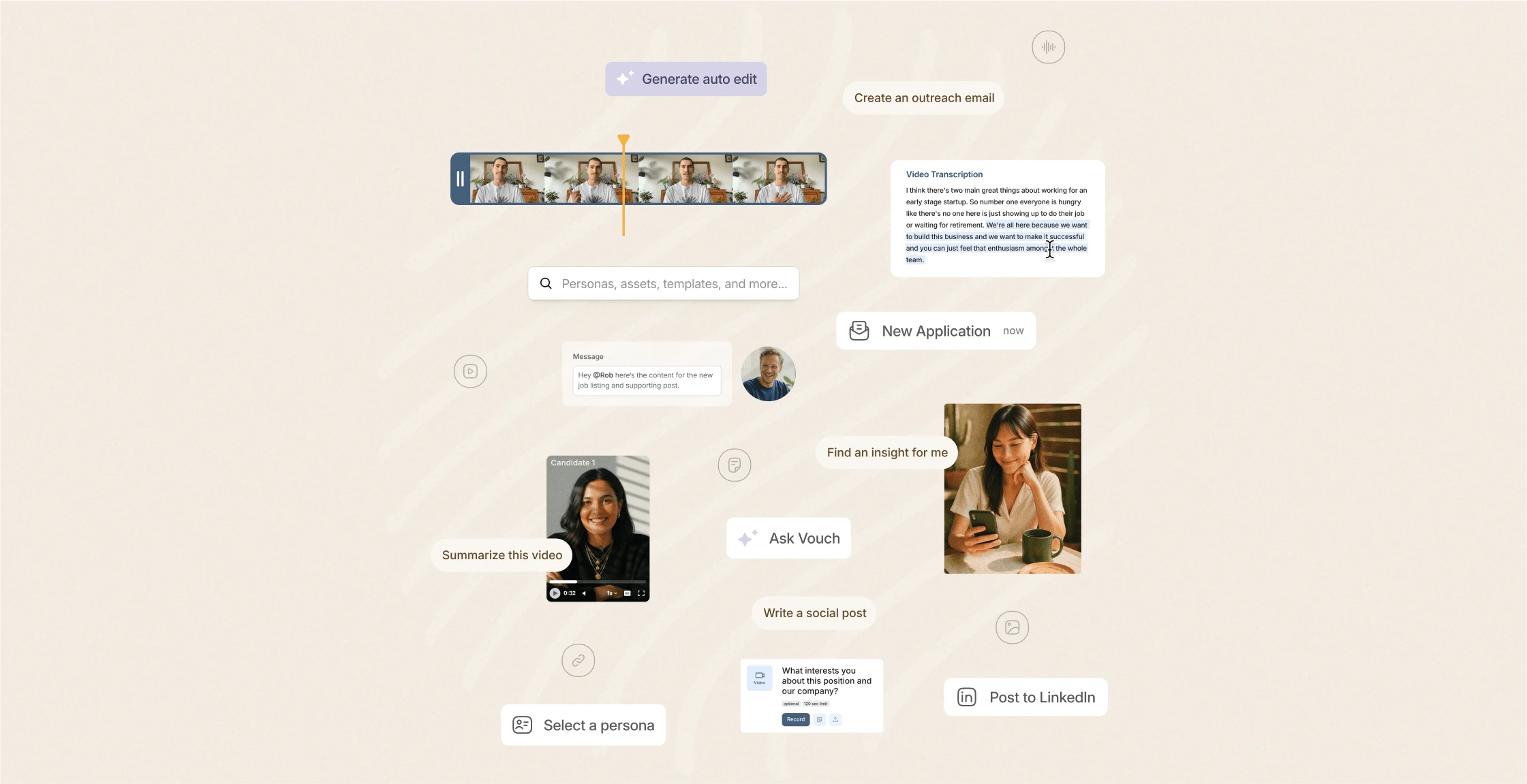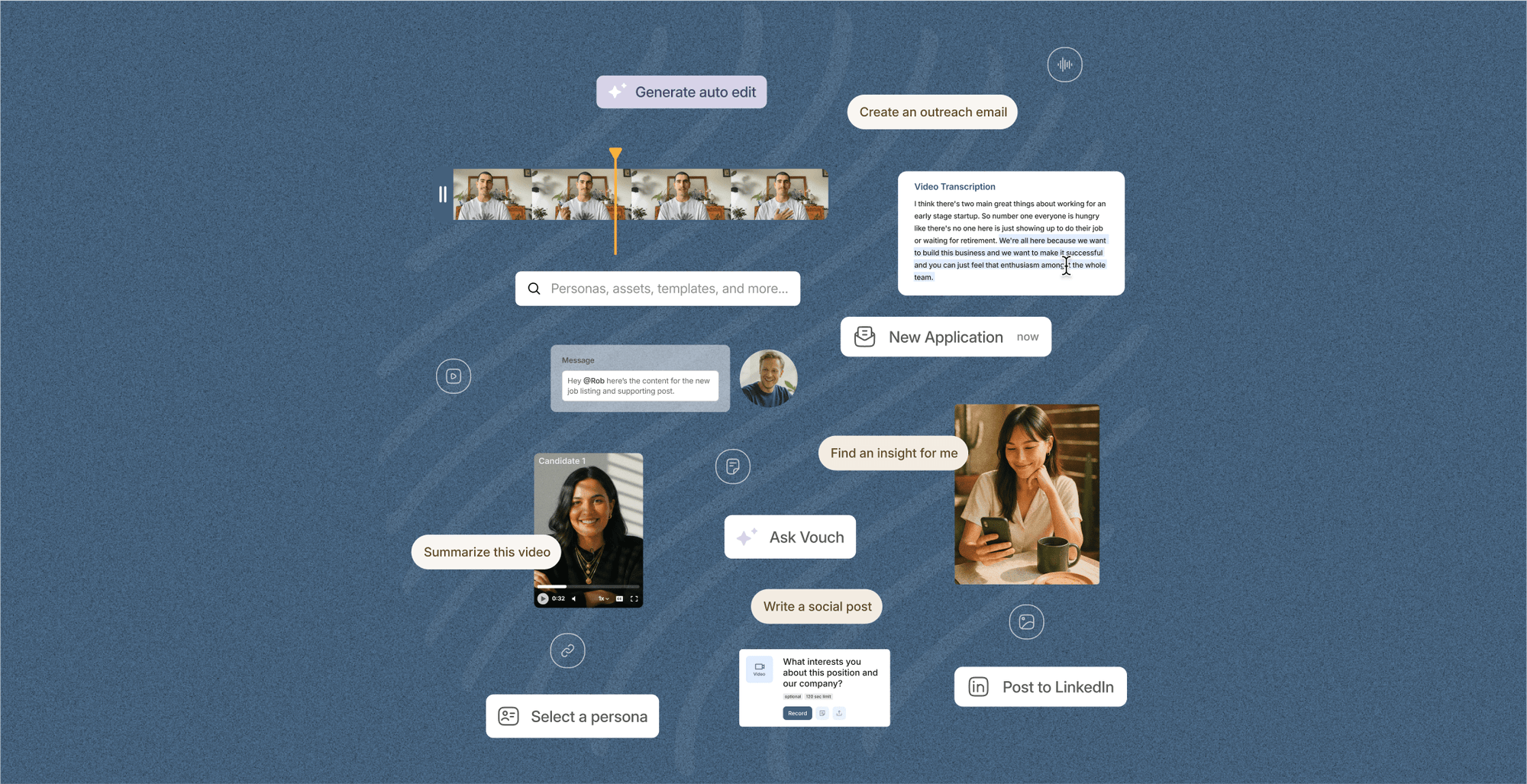Do you work in retail HR or talent acquisition?
If so, you'll surely know how competitive the retail industry is, and why standing out as an employer of choice is crucial.
And to become an employer of choice, your employer branding strategy is everything. Your retail employer brand helps you attract potential candidates, engage your current employees, and build a reputation as a highly desirable place to work in the retail sector.
Let's dive in.
Key Takeaways:
- Retail companies are increasingly facing high turnover, difficulty attracting qualified candidates, and seasonal hiring issues.
- Your Employee Value Proposition (EVP) is key to attracting and retaining top retail talent.
- Regularly audit your Cost per Hire and employee turnover to refine and improve your employer branding strategy.
- Modern tools like Vouch make retail employer branding simpler and more effective.
What Are The Challenges Of Retail Hiring And Employees?
Retail employers of all shapes and sizes, from boutique fashion stores to large retail chains like Walmart, Costco, Target and thousands more all experience the retail challenges.
Here are some of the biggest challenges you might be facing:
1. Higher Turnover Rates Than Other Industries
Retail jobs often experience higher employee turnover due to the seasonal nature of the work, low wages, and limited career advancement opportunities. This high turnover rate increases the need for constant recruitment, training, and onboarding of new employees.
2. Attracting Qualified Candidates
The retail sector often struggles to attract qualified candidates with the necessary skills and experience. Retail jobs can be viewed as less desirable compared to other industries, making it difficult to fill positions with the right talent.
3. Seasonal Hiring Fluctuations
Retail businesses often experience peaks and troughs in demand, particularly during holidays and sales seasons. This necessitates the hiring of temporary staff, which can be challenging due to the need for quick onboarding and training.
4. Competition for Talent At All Time Highs
The retail industry faces stiff competition for talent from other sectors, such as hospitality and service industries, which offer similar roles. This competition can drive up the cost of hiring and make it harder to attract top talent.
5. Retention of Part-Time Employees
Many retail positions are part-time, which can make it challenging to retain employees who may seek full-time employment or more stable opportunities elsewhere. Part-time workers may also be less engaged and committed compared to full-time employees.
6. Employer Brand Perception
Retail jobs can sometimes suffer from a negative brand perception, such as being seen as low-paying, high-stress, and with limited career prospects. Improving your employer brand to make retail positions more attractive can be a significant challenge.
7. Diversity and Inclusion
Ensuring a diverse and inclusive workforce can be particularly challenging in the retail sector. Retailers big and small must actively work to overcome biases in hiring and create an inclusive workplace culture that attracts a broad range of candidates.
8. Training and Development
Given the fast-paced nature of retail, providing adequate training and development opportunities for employees can be difficult. This is especially true for seasonal or temporary staff who may not stay long enough to benefit from comprehensive training programs. This is also where microlearning can be a game-changer.
9. Adapting to Technological Advances
The retail industry is rapidly evolving with technological advancements, such as e-commerce and digital payment systems. Finding candidates who are tech-savvy and can adapt to these changes can be a significant challenge.
10. Employee Engagement and Satisfaction
Maintaining high levels of employee engagement and satisfaction in the retail sector can be tough due to the demanding nature of the work. Retail jobs often involve long hours, irregular schedules, and high customer interaction, which can lead to burnout and dissatisfaction.
11. Effective Use of Recruitment Channels
Identifying and utilizing the most effective recruitment channels to reach potential candidates can be challenging. Retailers must balance traditional methods, such as job fairs and walk-in interviews, with modern approaches like social media recruiting and online job boards.
The AI-enabled workspace for talent teams.
- Unified workspace for talent teams
- Accelerate hiring with AI tools
- Auto-generate polished hiring and employer brand content
- Easily repurpose assets across all channel
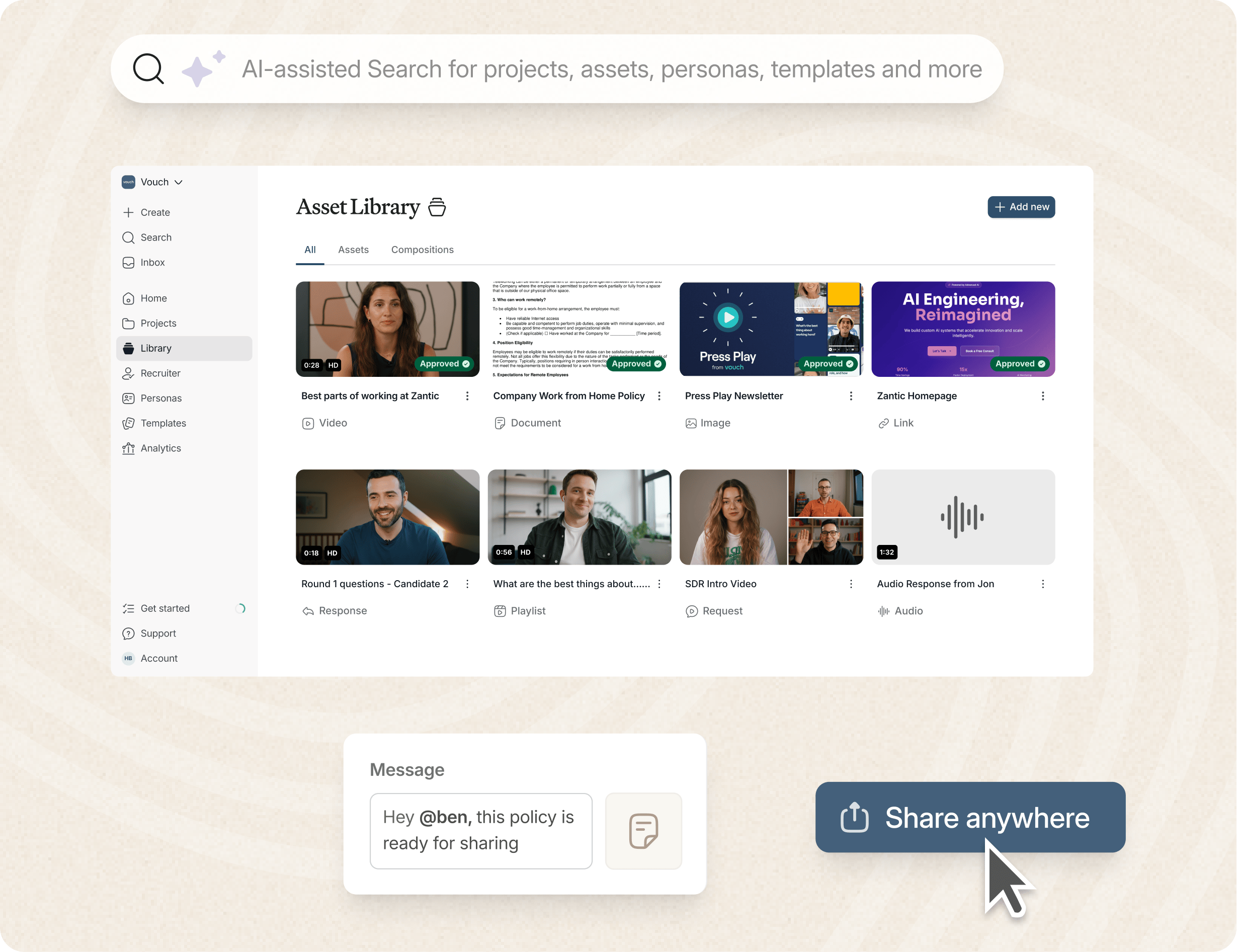
How Do You Build Your Retail Employer Brand in 2026?
To address the above challenges, there can are six major techniques that can help. These are:
Step 1: Define Your Employee Value Proposition (EVP)
Your Employee Value Proposition (EVP) is the foundation of your employer branding strategy.
It’s what you offer employees in return for their time, skills, dedication and experiences.
To create a compelling EVP, focus on:
- Employee Benefits: Highlight the perks and benefits you offer, such as health insurance, employee discounts, and professional development opportunities specific to the retail industry.
- Growth Opportunities: Emphasize career growth and advancement potential within your retail company.
- Company Values: Communicate your core values clearly, such as commitment to diversity, social responsibility, and providing exceptional customer service in the retail sector.
Step 2: Develop a Strong Company Culture
A strong company culture is a magnet for attracting the ideal candidates.
Promote a positive, inclusive culture where employees feel valued and motivated.
Key elements include:
- Company Events and Social Events: Regularly organize events that build camaraderie and a sense of belonging among your retail staff.
- Employee Testimonials and Success Stories: Share stories from high-performing employees to showcase your supportive work environment in retail.
- Employee Journey and Daily Life Videos: Use high-quality videos to give potential candidates a glimpse into the daily life at your retail company.
Step 3: Leverage Social Media Channels
Social media platforms are powerful tools for employer branding and recruitment in retail.
Use them to share your employer branding content and engage with potential candidates.
Here's how:
- Social Media Profiles and Social Media Presence: Maintain active and engaging profiles on platforms like LinkedIn, Instagram, and Facebook, tailored to the retail industry.
- Blog Posts and Employer Branding Videos: Regularly publish content that highlights your company culture, employee experiences, and corporate values specific to retail.
Step 4: Enhance Your Candidate Experience
A positive candidate experience is essential for attracting top talent in retail.
Streamline your recruitment process to make it efficient and enjoyable for job seekers.
Here's how:
- Job Descriptions and Job Posts: Write clear, engaging job descriptions that accurately reflect the role and your company’s culture in the retail sector.
- Application Process and Hiring Process: Ensure your application and hiring processes are smooth and candidate-friendly, particularly for retail roles.
- Exit Interviews: Use exit interviews to gather feedback and improve your recruitment strategy in retail.
Step 5: Focus on Internal Communication
Effective internal communication is vital for maintaining employee engagement in the retail industry.
- Internal Communication: use Video tools like Vouch to keep employees informed and involved in company news, updates, and events.
- Employee-Generated Content: Encourage employees to share their experiences and insights on internal platforms and social media, specifically related to their roles in retail.
Step 6: Optimize Your Employer Branding Efforts
Regularly assess the effectiveness of your employer branding strategy and make adjustments as needed.
- Employer Branding Audit: Conduct periodic audits to evaluate your employer branding materials, social media accounts, and recruitment efforts in retail.
- Metrics to Track: Monitor key metrics such as Cost per Hire, Quality of Hire, retention rates, and employee turnover rates in the retail sector.
FAQs
Why is employer branding important in the retail industry?
Employer branding is crucial in retail to attract potential candidates, engage current employees, and build a reputation as a desirable workplace, especially given the industry's competitive nature and high turnover rates.
What are the main challenges in hiring for retail positions?
Retail hiring challenges include high turnover rates, difficulty attracting qualified candidates, seasonal hiring fluctuations, competition for talent, and maintaining employee engagement and satisfaction.
How can retail companies improve their employer brand?
Retail companies can enhance their employer brand by defining a compelling Employee Value Proposition (EVP), fostering a strong company culture, leveraging social media, improving the candidate experience, and focusing on internal communication.
What strategies can help overcome hiring challenges in retail?
Strategies include offering competitive compensation packages, providing flexible work arrangements, developing robust training programs, focusing on employee engagement, promoting diversity and inclusion, and leveraging advanced recruitment technologies.
How can you measure the effectiveness of your employer branding within retail?
Effectiveness can be measured through periodic employer branding audits, employee surveys and tracking key metrics such as Cost per Hire, Quality of Hire, retention rates, and employee turnover rates.
Conclusion: Investing in Employer Branding
Investing in employer branding is not just about attracting potential candidates; it's about building a strong, cohesive team that drives your retail business forward.
By focusing on employee satisfaction and experience, professional development, and effective communication, you can create a workplace where employees are proud to work and eager to grow.
By following these steps, leveraging tools like Vouch and continuously refining your approach, you can build your retail employer brand and create a compelling narrative that resonates with both current and potential employees.
Vouch Can Help Your Retail Employer Branding!
Loved by companies like Canva, Nike, Cisco, HubSpot, Amazon, and more, tools like Vouch make leveraging video in your business remarkably easy.
Book a Vouch demo today and chat with a video content marketing expert about your business needs.
You might also like

Elevate Your Brand Today With Vouch
Discover how Vouch can accelerate talent acquisition while helping you stay on-brand.

